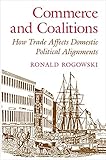Commerce and Coalitions : How Trade Affects Domestic Political Alignments / Ronald Rogowski.
Material type: TextPublisher: Princeton, NJ : Princeton University Press, [2021]Copyright date: ©1990Description: 1 online resource (232 p.)Content type:
TextPublisher: Princeton, NJ : Princeton University Press, [2021]Copyright date: ©1990Description: 1 online resource (232 p.)Content type: - 9780691219431
- Coalitions -- History
- International trade -- Political aspects -- History
- Political stability -- History
- World politics
- BUSINESS & ECONOMICS / Economic History
- Argentina: in interwar period
- Australia: in interwar period
- Bates, Robert
- Bismarck, Otto von
- Canada: in interwar period
- Corinth
- El Salvador
- European Community
- Germany, East
- Greece, ancient
- Hinton, William
- Iran, in postwar period
- Islam, sources of rise
- Japan: in interwar period
- Kenya
- Kindleberger, Charles
- Learner, Edward
- Leontieff paradox
- Moore, Barrington, Jr
- Myint, Hla
- Nelson, Joan
- Olson, Mancur
- Philippines
- Pirenne thesis
- Roman Empire
- Sparta
- Vichy regime
- class conflict
- factor mobility
- fascism
- human capital
- socialism
- 382/.3
- online - DeGruyter
| Item type | Current library | Call number | URL | Status | Notes | Barcode | |
|---|---|---|---|---|---|---|---|
 eBook
eBook
|
Biblioteca "Angelicum" Pont. Univ. S.Tommaso d'Aquino Nuvola online | online - DeGruyter (Browse shelf(Opens below)) | Online access | Not for loan (Accesso limitato) | Accesso per gli utenti autorizzati / Access for authorized users | (dgr)9780691219431 |
Browsing Biblioteca "Angelicum" Pont. Univ. S.Tommaso d'Aquino shelves, Shelving location: Nuvola online Close shelf browser (Hides shelf browser)

|

|

|

|

|

|

|
||
| online - DeGruyter The Humanity of Thucydides / | online - DeGruyter Political Control of the Economy / | online - DeGruyter Bartók and His World / | online - DeGruyter Commerce and Coalitions : How Trade Affects Domestic Political Alignments / | online - DeGruyter Plato's Individuals / | online - DeGruyter Revolutions of 1848 : A Social History / | online - DeGruyter Aristotle's De Motu Animalium / |
Frontmatter -- Contents -- List of Illustrations -- List of Tables -- Preface and Acknowledgments -- List of Abbreviations -- CHAPTER ONE Why Changing Exposure to Trade Should Affect Political Cleavages -- CHAPTER TWO The Revolutionary Expansion of Trade, 1840 to 1914 -- CHAPTER THREE The Interwar Period and the Depression of the 1930s: The Decline and Fall of World Trade -- CHAPTER FOUR Renewed Expansion of Trade, 1948 to the Present -- CHAPTER FIVE Earlier Periods of Changing Trade: Classical Greece, the Declining Roman Empire, and Sixteenth-Century Europe -- CHAPTER six Some Implications for Other Theories and Conjectures in the Social Sciences -- CHAPTER SEVEN Conclusion -- Appendix -- Bibliography -- Index
restricted access online access with authorization star
http://purl.org/coar/access_right/c_16ec
Why do countries differ so greatly in their patterns of political cleavage and coalition? Extending some basic findings of economic theories of international trade, Ronald Rogowski suggests a startling new answer. Testing his hypothesis chiefly against the evidence of the last century and a half, but extending it also to the ancient world and the sixteenth century, he finds a surprising degree of confirmation and some intriguing exceptions.
Mode of access: Internet via World Wide Web.
In English.
Description based on online resource; title from PDF title page (publisher's Web site, viewed 30. Aug 2021)


